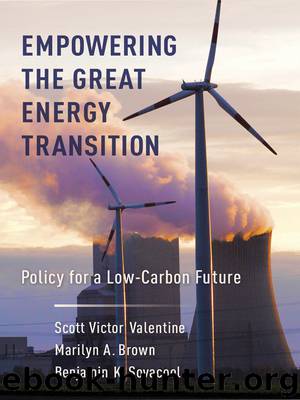Empowering the Great Energy Transition by Scott Valentine

Author:Scott Valentine
Language: eng
Format: epub
Tags: SCI092000, Science/Global Warming & Climate Change, POL044000, Political Science/Public Policy/Environmental Policy
Publisher: Columbia University Press
Published: 2019-12-17T00:00:00+00:00
Common Organizational Instruments
Within the NATO framework, organization instruments are essentially the boots-on-the-ground initiatives that governments support through agencies, advisory boards, public or industry one-stop energy shops, public think tanks, public universities, and private-public partnerships. The allure of direct government provision of energy services, education and consulting services, and research is intuitively obvious: it affords government more control over the entire policy process, from policy design to implementation.102 The downside is that government implementation does not always achieve optimal levels of effectiveness.
In the energy sector there have been some particularly adept uses of organization instruments and some valuable lessons learned. First and foremost is the structuring of electricity provision infrastructure. Because energy is such a strategically important commodity, many nations, ranging from Taiwan and China to Kazakhstan and Canada, nationalize energy provision by establishing public utilities. However, a common criticism of this approach is that it leads to inflated energy costs because of the inefficiencies within the public utility and the lack of competition. Consequently, the model that seems to have gained the most traction as nations begin to explore ways to integrate the cheapest possible renewable energy contributions is a public grid operator that is mandated to accept electricity flows from private energy producers. This model strikes an effective balance in that competition at the generation phase is encouraged while grid-level economies of scale and security can be effectively controlled by national grid operators.
Regardless of how electricity provision is structured, the strategic importance of electricity in supporting economic development and human welfare motivates nations to establish regulatory authorities to oversee the process. The role of electricity regulator differs by nation, but common tasks include administration of taxes, regulation of energy prices, enforcement of operational regulations, and market coordination to ensure that there is sufficient supply to meet demand. As more renewable energy capacity is added to the energy mix, these regulatory authorities serve an important role in ensuring that the process is managed so that communities are not adversely affected (e.g., by overseeing wind power development codes in Denmark), private utilities are not erecting artificial barriers to stymie renewable energy contributions to the grid (as has been the case in Japan in the past),103 and the system is working for all (as opposed to the situation in China, where some new wind power installations were left unconnected to the grid).104
When it comes to the design of policy in the energy sector, a recent development is the emergence of specialized government departments that are charged with the task of investigating and analyzing energy policies and innovating new policy solutions. For example, the Singaporean Civil Service College has a specialized unit that investigates enhanced policy through behavioral nudges. Singapore Land Transport Authority (LTA) also has a team of behavioral economists who work on similar strategies in regard to influencing use of public transportation. As a result, between 2012 and 2014, the LTA launched a “Travel Smart Rewards” scheme designed to incentivize the public to shift travel to off-peak hours in order to ease peak travel congestion.
Download
This site does not store any files on its server. We only index and link to content provided by other sites. Please contact the content providers to delete copyright contents if any and email us, we'll remove relevant links or contents immediately.
The Secret History by Donna Tartt(19083)
The Social Justice Warrior Handbook by Lisa De Pasquale(12190)
Thirteen Reasons Why by Jay Asher(8907)
This Is How You Lose Her by Junot Diaz(6885)
Weapons of Math Destruction by Cathy O'Neil(6279)
Zero to One by Peter Thiel(5800)
Beartown by Fredrik Backman(5751)
The Myth of the Strong Leader by Archie Brown(5507)
The Fire Next Time by James Baldwin(5441)
How Democracies Die by Steven Levitsky & Daniel Ziblatt(5218)
Promise Me, Dad by Joe Biden(5153)
Stone's Rules by Roger Stone(5087)
A Higher Loyalty: Truth, Lies, and Leadership by James Comey(4959)
100 Deadly Skills by Clint Emerson(4924)
Rise and Kill First by Ronen Bergman(4788)
Secrecy World by Jake Bernstein(4751)
The David Icke Guide to the Global Conspiracy (and how to end it) by David Icke(4717)
The Farm by Tom Rob Smith(4506)
The Doomsday Machine by Daniel Ellsberg(4490)
